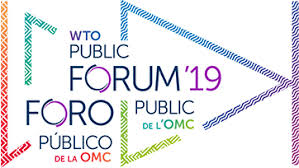What e-commerce business models mean for trade policy in the digital era
10 Oct 2019 02:00h
Event report
[Read more session reports from WTO Public Forum 2019]
The session was moderated by Mr Javier Lopez Gonzalez (Senior Trade Policy Analyst, OECD) who said that today we engage in trade more directly than ever. He noted that we have something to gain with digital trade. In addition, he noted the changes made by technology in this sector, for example, the use of platforms to facilitate online transactions, the online process combined with offline activities in the brick and mortar stores, etc. He invited the panellists to discuss the role of business models for trade policy.
Mr Ziyang Fan (Centre for the Fourth Industrial Revolution, WEF) talked about how artificial intelligence (AI) and technology are changing the way we do the businesses. He emphasised the efficiency of e-commerce, for example, by using machine learning and blockchain. He said that blockchain is building trust between the partners in business. In addition, he noted the importance of crypto-currency as a type of payment. He pointed out the Internet of Things (IoT), 5G with rapid connectivity.
In addition, Fan talked about the cross-border data flows and he mentioned that data is the new oil. He added that data is like ‘oxygen’ and noted its presence in every sector of the digital economy. He also said that countries need to use it wisely and pointed to the role of protecting the security and privacy of consumers. According to him, we must focus on regional spaces by harmonising the regulation and tackling the challenges in regulating data. He continued that we need collaboration between the private and public sectors. Answering a question from the audience, he highlighted that we still have the challenges of 3D printing even in the developed countries, as the equipment and product costs are high, there is a knowledge gap, etc.
Mr Jan Tscheke (Economist, Directorate for Science, Technology and Innovation, OECD) talked about the online platforms as the tool of doing e-commerce transaction. He added that AI is helping to build the new market of digital trade. He gave the example of Uber and said that consumers can be facilitated to buy the products easily with digitalisation. In addition, he pointed out the digital ordering of products. He also noted the challenges of e-payments in rural areas because of the lack of infrastructure.
Tscheke emphasised that there is a huge divide between big companies and small and medium-sized enterprises (SMEs) in doing e-commerce. He noted the gap between high-income and low-income people, rural areas, and cities. He also noted the role of regulatory frameworks. He highlighted the importance to harmonise the rules of B2B and B2C.
In addition, he emphasised the challenge of the small producers’ integration on the global market. He added the complexity of selling as SMEs on the international level. He pointed out the problem of privacy and security and added that there is a dialogue among OECD members on these issues. Moreover, he talked about the policy communities on digital transformation and emphasised the need for integrated frameworks set by the governments. He continued that we need innovation in order to reduce the digital divide, and that the policy-makers must look at the business models in providing the solutions. Finally, he also highlighted the importance of using data and analysing digital identity. He talked about blockchain as a very useful tool in policy-making and digital trade.
Ms Sarah F. Thorn (Senior Director, Walmart) said that there is a digital transformation in customer preferences. She noted the importance of ordering online in Walmart and emphasised the rapid transaction. She talked about the use of robots in doing business and the role of blockchain to build trust between her company and customers.
In addition, Thorn mentioned the importance of understanding the needs of customers. She said that we need an eco-system that supports e-payment and the use of data. She emphasised the role of collaboration between the governments and businesses in order to tackle these issues. She asked how we make sure the regulation is appropriate to build trust, and whether we need partnership in building the regulatory policies and trade facilitation.
Moreover, she said that the policymakers must understand the needs of customers and the challenges of taxes in cross-border trade. She mentioned the flexible policy-making in regulating AI and e-commerce. She pointed out the need for digital-skilled workers in order to compete in the digital world. Finally, she noted the role of analysing data in order to improve the quality of products.
Ms Devi Ariyani (Executive Director, Indonesia Services Dialogue Council) explained that people still think that education and health services are not impacted by digital transformation. However, she said that the finance area is changed by technology. In addition, she talked about the digital eco-system in Indonesia and the issue of the data flows. Moreover, she said that it is difficult to harmonise the policy-making and said that we need the interoperability for example in e-payments. Finally, she pointed out that blockchain is very efficient in doing digital trade.
Related topics
Related event

